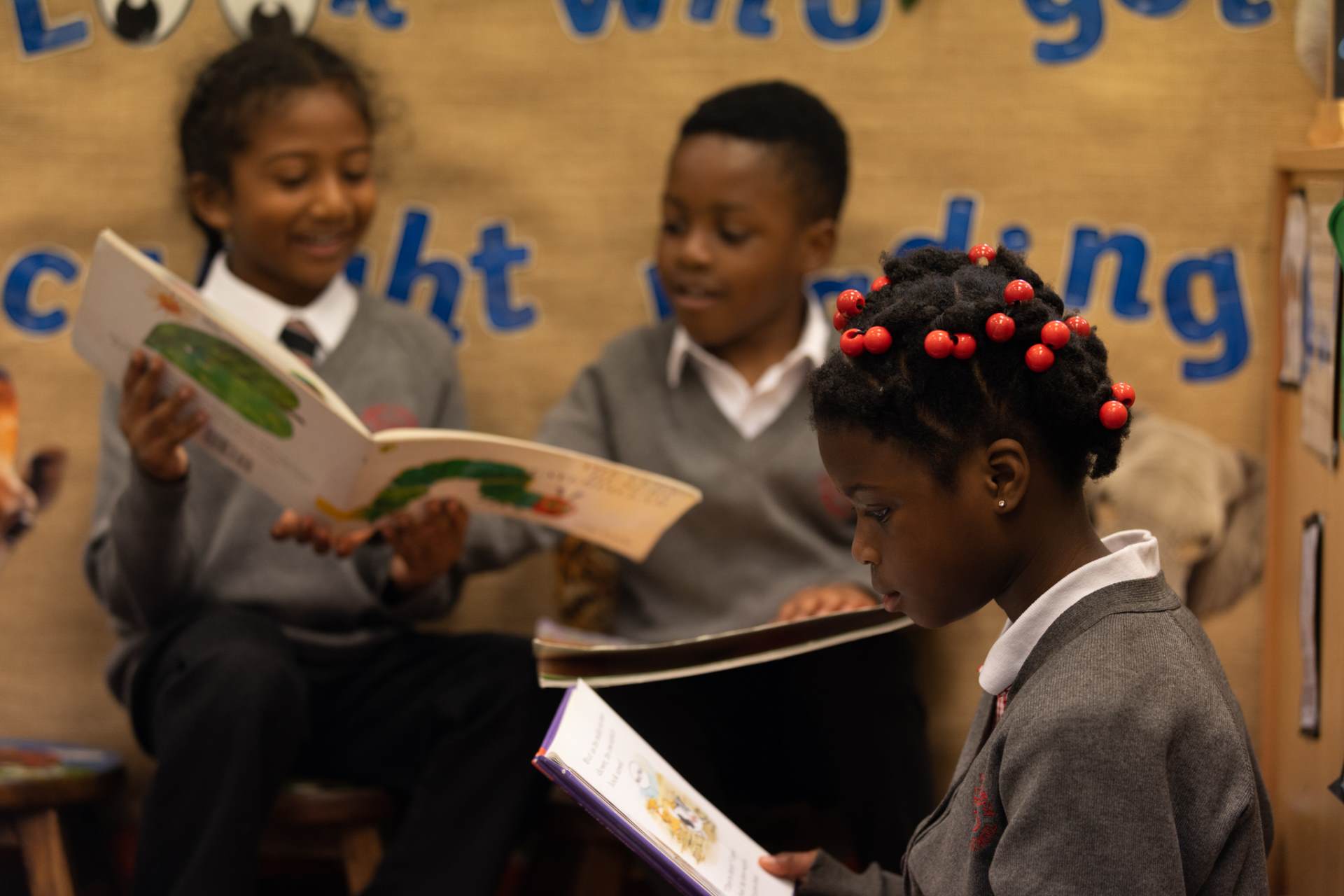English at Christ Church

Our approach to teaching English is rooted in our vision every child is a unique gift from God and built on our core values of love, faith, and hope. This approach embraces diversity, ensuring that all children can see themselves reflected in the texts we choose and feel valued within the learning environment.
Our approach is:
- Vision-Driven Text Selection
We select texts that reflect the belief that each child is unique and has inherent worth. Stories are chosen to celebrate individuality, diversity, and the value of every human being, reinforcing our vision and values of love, faith, and hope.
- Emphasising Diversity
We ensure that our texts represent a wide range of cultures, ethnicities, abilities, and perspectives. By including authors and characters from diverse backgrounds, we help children connect with different experiences, fostering empathy and understanding.
- Reflecting Children’s Lives
Our text choices reflect the experiences, challenges, and triumphs that resonate with the children in our school. These stories provide a mirror for students to see themselves, their families, and their communities, helping them feel a strong sense of belonging and validation.
- Building Empathy and Understanding
Through the power of stories, we aim to build empathy. We choose texts that encourage students to explore different viewpoints and reflect on the experiences of others, linking these to our values of love, hope, and faith in action.
- Fostering Critical Thinking
Our approach encourages children to think deeply about the themes they encounter in literature and how these connect to their own lives and values. Discussions are centred around questions like, "How does this character show love?" or "How does this story teach us about hope?"
- Creating an Inclusive Learning Environment
We nurture a classroom where every child’s voice is heard and valued. We encourage students to share their experiences and relate these to the texts they read, creating a vibrant, inclusive learning space where diversity is celebrated.
In this way, our approach to teaching English is not only about academic success but also about nurturing the whole child, helping them to grow in confidence, empathy, and a deeper understanding of themselves and others.
Our Approach to Teaching Reading and Phonic Skill
Learning to read is one of the most important things your child will learn at our school. Everything else depends on it, so we put as much energy as we possibly can into making sure that every single child learns to read as quickly as possible.
We want your child to love reading – and to want to read for themselves. This is why we work hard to make sure children develop a love of books as well as simply learning to read.
Phonics at Christ Church
 Read Write Inc Phonics Scheme
Read Write Inc Phonics Scheme
Read, Write, Inc is a phonics scheme designed and developed by Ruth Miskin, one of the country’s leading authorities on teaching children to read. The programme aims to create fluent readers, willing writers and confident speakers. As a school, we have recently invested in this resource because we want our children to learn to read as quickly as possible, and then read widely and become lifelong readers.
Five key principles underpin the teaching in all Read Write Inc. sessions:
1) Participation – As they are in small groups, children participate fully in every session. They are able to maintain high levels of concentration and they do not miss key elements of the teaching.
2) Praise – Children work together as partners. They take turns to teach and praise each other. They are motivated by praise from their teachers and teaching assistants.
3) Pace – Sessions never drag. The lively pace keeps every child fully engaged and on task.
4) Purpose – Every instructor has been trained in Read Write Inc. methods. They know the purpose of each activity, and how it leads into the next.
5) Passion – Instructors, too, become passionate about their teaching as they see the children enjoying the progress they are making.
Staff are being trained to teach using RWI and to carry out the programme effectively with small groups of children. These groups are organised according to their specific needs, and the specific sounds and letters are taught in fun and engaging ways.
Each session will last about 20 minutes rising to an hour and includes a variety of activities delivered with pace and rigor. Children will have the opportunity to learn sounds that are reinforced during the session with reading and writing activities – learning is then put into practice.
As children progress through the levels, they will be regularly assessed to ensure they are placed in groups most appropriate for them. Children may also be ‘fast-tracked’ to a more able group when their progress warrants this.
Reading at Christ Church
Once children can blend sounds together to read words, they practice reading books that match the phonics and the ‘tricky words’ they know. They start to believe they can read and this does wonders for their confidence.
Teachers regularly read to the children, too, so the children get to know and love all sorts of stories, poetry and information books. This helps to extend children’s vocabulary and comprehension, as well as supporting their writing. Throughout school, reading skills are also taught using a wide range of materials. Children develop reading skills through daily guided reading, shared reading and individual reading sessions.
Up until the end of Year 2, your child will work with children who are at the same reading level. This is so that the teaching can be focused on their needs. Some older children will continue to access phonics groups using resources from Read Write Inc including the Fresh Start modules if they need further consolidation and development of reading skills. We check children’s reading skills regularly so that we can ensure they are in the right group. Children will move to a different group if they are making faster progress or may have one-to-one support if we think they need some extra help.
Click here for our whole-school reading overview
Click here for our Progression of Skills and Knowledge in Reading Document
How long will it take to learn to read well?
Every child is different and children will learn to read at different speeds. By the end of Year 2, most children will be able to read aloud books that are at the right level for his or her age. In Year 3 and beyond, we concentrate more on helping children to understand what they are reading, although this work begins very early on.
What can Parents/carers do to help?
When your child starts Reception, you will be invited to a meeting so that we can explain how we teach reading and show you the resources we use. During the meeting, there are lots of suggestions on how you can help your child to read. Your support really does get your child off to a flying start and encourages them to make great progress!
You can help your child to sound out the letters in words and then to ‘blend’ the sounds together to make a whole word. Try not to refer to the letters by their names. Help your child to focus on the sounds. You can hear how to say the sounds correctly by searching on YouTube for ‘Read Write Inc. Phonemes Pronunciation Guide’
Sometimes your child might bring home a picture book that they know well. Please don’t say, ‘This is too easy.’ Instead, encourage your child to tell you the story out loud; ask them questions about things that happen or what they think about some of the characters in the story.
Make reading fun! Remember to keep reading to your child. They will come across far more adventurous words than they will in their early reading books. You will be helping them to grow a vast vocabulary and understand the meaning of different stories etc. It will also encourage them to love books and want to read more!
To access a wide variety of free e-Books, click on www.oxfordowl.co.uk
Go to the Reading Section then follow the link to e-Books and choose a book.
Luke 2:52 – ‘And Jesus increased in wisdom and in years and in divine and human favour.'







